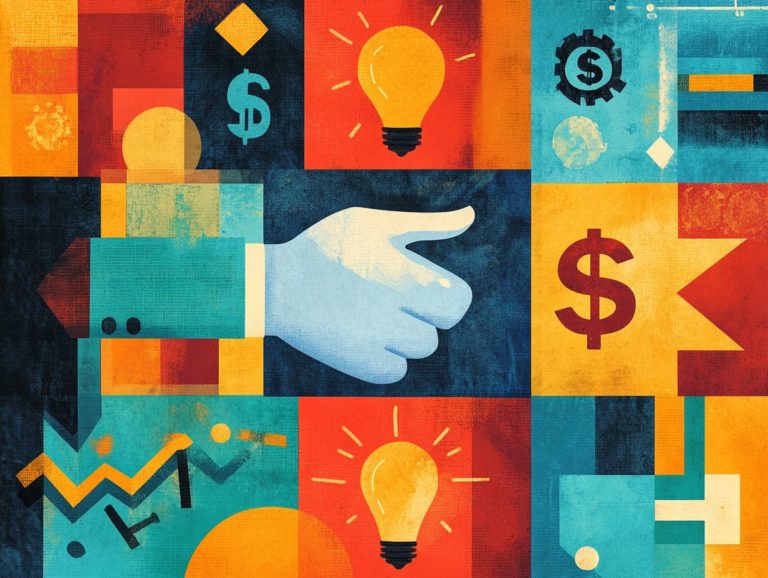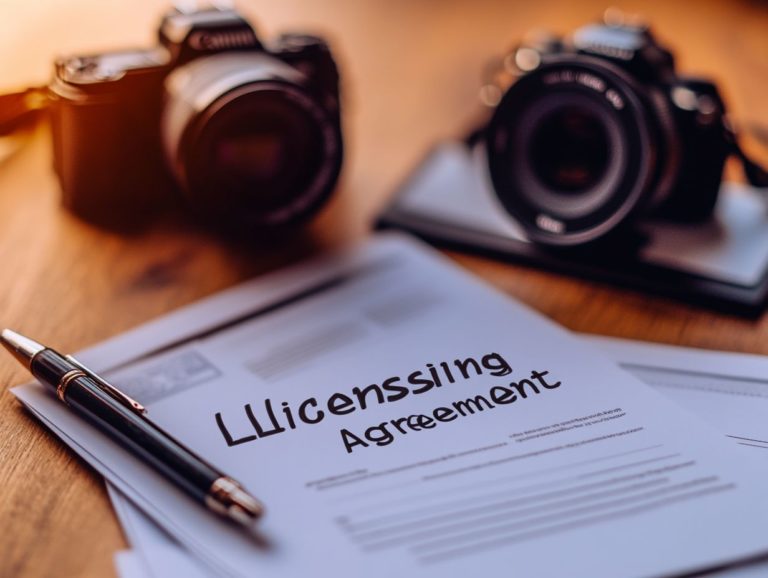5 Industries That Benefit from Licensing Agreements
Licensing agreements are essential in various industries, allowing businesses like yours to harness each other s strengths and resources effectively.
Whether you re in the software sector, entertainment, or pharmaceuticals, these agreements foster collaboration and drive growth. Let s dive into five exciting industries thriving on licensing agreements!
You ll also discover the different types of licensing arrangements available, alongside the potential risks involved. This will help you assess whether a licensing agreement could be the right fit for your business. Dive in as we unravel the complexities of the licensing landscape!
Contents
- Key Takeaways:
- 1. Software Industry
- 2. Entertainment Industry
- 3. Pharmaceutical Industry
- 4. Technology Industry
- 5. Franchise Industry
- What Is a Licensing Agreement?
- Frequently Asked Questions
- What is a licensing agreement?
- Which industries benefit from licensing agreements?
- How do software companies gain from licensing agreements?
- What are the benefits of licensing in the entertainment industry?
- How do sports organizations profit from licensing agreements?
- What advantages do fashion companies see from licensing agreements?
Key Takeaways:

Software, entertainment, pharmaceutical, technology, and franchise industries all benefit from licensing agreements.
These agreements allow for the legal use and distribution of creative ideas and inventions, leading to increased revenue and market reach for both parties.
Understanding these key elements, types, and potential risks can unlock incredible growth opportunities for your business!
1. Software Industry
The software industry offers a dynamic arena for brand licensing. As a successful brand owner, you can leverage licensing agreements to expand your reach and boost profits, while also protecting your creative ideas and inventions. Understanding the top industries that rely on patents can further enhance your strategy.
Through these agreements, you can access new markets and demographics, elevating your brand s visibility and recognition in a fiercely competitive landscape.
For instance, a well-established software company might choose to license its technology to third-party developers. This enables them to create complementary applications or services and broadens your consumer base.
This collaboration enhances the credibility and appeal of your parent brand. Such strategic alliances can significantly drive revenue generation, benefiting both parties with increased sales and market presence.
Ultimately, this fosters innovation and growth within the sector.
2. Entertainment Industry
In the entertainment industry, brand licensing is an invaluable tool for elevating your brand equity and visibility. It allows you to forge strategic partnerships that enhance the customer experience and tap into that all-important emotional appeal.
This dynamic approach opens doors for joint ventures and facilitates collaborations that enrich storytelling for your audiences. Imagine a popular film franchise licensing its characters to a toy manufacturer; this creates merchandise that resonates with fans while generating significant revenue through licensing royalties.
These partnerships highlight the need to understand market trends and consumer preferences, ensuring that both parties reap the rewards of the collaboration.
By leveraging your market expertise, you can navigate the intricacies of licensing agreements, maximizing your brand outreach and solidifying your position in the competitive landscape of media and entertainment.
3. Pharmaceutical Industry
The pharmaceutical industry relies heavily on brand licensing, as companies like yours aim to maximize creative ideas and inventions through strategic licensing agreements. These agreements not only protect patents and trademarked products but also create substantial licensing royalties.
By entering into these partnerships, you can expand your reach into wider markets and foster collaborations that pave the way for innovative drug development solutions.
Leveraging established brands allows you to navigate regulatory landscapes more effectively and enhance your market entry strategies. The protection that patents and trademarks provide is essential in securing competitive advantages.
This enables you to safeguard your inventions from infringement while enjoying the benefits of exclusive rights. This dynamic interplay between creative ideas and brand licensing fundamentally shapes revenue generation, making it a crucial element for growth and sustainability in the complex pharmaceutical landscape.
4. Technology Industry

The technology industry is your playground for innovation, where brand licensing can give you a competitive edge. By forming smart partnerships, you can expand your market entry, enhance brand recognition, and significantly increase your licensing revenues.
When you collaborate with established brands, you open the door to new consumer bases and leverage each other’s strengths. For instance, if you specialize in smart home devices, partnering with a renowned electronics brand can elevate your credibility and visibility in a crowded marketplace.
Consider the collaboration between Apple and Beats; it not only expanded the reach of audio products but also introduced fresh marketing strategies that turned heads. Companies like Samsung have successfully extended their brand presence through licensing agreements across various sectors, proving that smart partnerships can propel technological advancement and foster consumer loyalty.
5. Franchise Industry
In the franchise industry, brand licensing is crucial for fast food chains and other franchises looking to extend their brand. It ensures consistent quality control and enhances the customer experience across various locations.
This strategy bolsters customer trust while safeguarding the brand’s reputation in a competitive landscape. By leveraging established trademarks and designs, you can effectively penetrate new markets while upholding your core values and standards.
Brand licensing paves the way for marketing collaborations, boosting visibility and brand recognition. As your franchises expand, customers can reliably expect the same quality and service, making them more inclined to engage with and remain loyal to your brand, no matter where they are.
What Is a Licensing Agreement?
A licensing agreement is a legal contract that you, as a brand owner, enter into to grant permission for the use of your intellectual property, like trademarks and copyrights. This can open doors to new markets and enhance your brand equity.
This agreement clearly outlines the specific terms for utilizing your intellectual property, including the duration, territory, and compensation details. Embracing brand licensing can transform your business by strategically leveraging your assets to collaborate with other entities, thereby expanding your reach and influence.
Protecting your intellectual property rights within these agreements is essential. It ensures you guard against unauthorized use and potential infringement, helping maintain your brand s unique identity and reputation. This protection fosters consumer trust and loyalty, which are critical for long-term business success.
What Are the Key Elements of a Licensing Agreement?
- Scope of use: Clarifies how you can utilize the licensed products, preventing potential conflicts over rights.
- Financial terms: Lays out the monetary compensation and sets clear expectations for revenue sharing.
- Quality control measures: Protects the brand s reputation, ensuring all licensed products meet established standards to maintain consumer trust.
- Duration: Establishes a timeframe for collaboration, allowing for effective future strategies.
Together, these elements create a robust foundation for a partnership that benefits both the licensor and the licensee.
Ready to unlock new opportunities? Start your licensing journey today!
How Can a Licensing Agreement Benefit Both Parties?

A well-structured licensing agreement creates benefits for both you and your partner. It fosters partnerships that enhance revenue and provide a competitive edge in the marketplace.
With these agreements, you leverage your partner’s market expertise. You gain access to new customer segments and geographical regions.
Imagine a toy manufacturer licensing its characters to an apparel company. This collaboration boosts visibility for both brands in the children’s fashion sector!
These partnerships often come with financial perks, such as royalties or upfront payments. Sharing resources can also enhance both parties’ brand visibility.
A great example is the licensing deal between Nike and Disney. This collaboration combines sports with beloved characters, elevating both brands.
What Are the Different Types of Licensing Agreements?
Licensing agreements come in several forms: exclusive, non-exclusive, and sole. Each type presents unique brand licensing rights that shape your strategy.
Understanding these variations is essential for you as a brand owner. Each type carries implications for control, revenue generation, and market reach.
For instance, an exclusive agreement lets a single partner leverage your brand, enhancing visibility while limiting competition. A non-exclusive license allows multiple partners to use your brand, broadening your presence.
Sole agreements strike a balance. They offer some exclusivity while letting you engage directly, helping maintain visibility in various sectors.
What Are the Risks and Challenges of Licensing Agreements?
Licensing agreements come with benefits, but they also present risks. If quality control isn’t prioritized, your brand’s equity might suffer.
Issues often arise when licensed products don’t reflect your brand’s values. This can lead to customer dissatisfaction and a tarnished reputation.
To tackle these challenges head-on, establish clear communication from the start. Set defined performance metrics to ensure everyone is on the same page.
Regular audits of licensed products help maintain quality standards. By building trust and understanding, you can safeguard your brand’s integrity.
How Can a Business Determine If a Licensing Agreement Is Right for Them?
Deciding if a licensing agreement fits your business requires careful evaluation. Align your brand strategy and market objectives with your corporate goals.
Key factors demand your attention. Conduct thorough market analysis to understand demographics and trends, unveiling opportunities and challenges.
Examine the financial implications. Assess licensing fees and potential royalties to gauge their impact on cash flow.
The agreement must align with your branding goals, ensuring the partnership resonates with your identity and values. Consistent messaging strengthens customer loyalty.
By considering these elements, you create a roadmap for successful collaboration. This paves the way for your business to thrive!
Frequently Asked Questions

What is a licensing agreement?
A licensing agreement is a legal contract. In this contract, the owner permits the user to use their intellectual property, like patents or trademarks, in exchange for a fee.
Which industries benefit from licensing agreements?
Many industries benefit from licensing agreements. These include software, entertainment, sports, fashion, and consumer products.
How do software companies gain from licensing agreements?
Software companies allow others to use their software for a fee. This helps them reach more customers and earn extra income.
What are the benefits of licensing in the entertainment industry?
Licensing allows content creators to share movies, TV shows, and music more widely. This increases their revenue and brand visibility.
How do sports organizations profit from licensing agreements?
Sports organizations let their logos and team names appear on merchandise. This approach boosts revenue and broadens brand recognition.
What advantages do fashion companies see from licensing agreements?
Fashion companies use licensing to place designer labels on products like clothing and accessories. This strategy enhances brand awareness and increases revenue.






